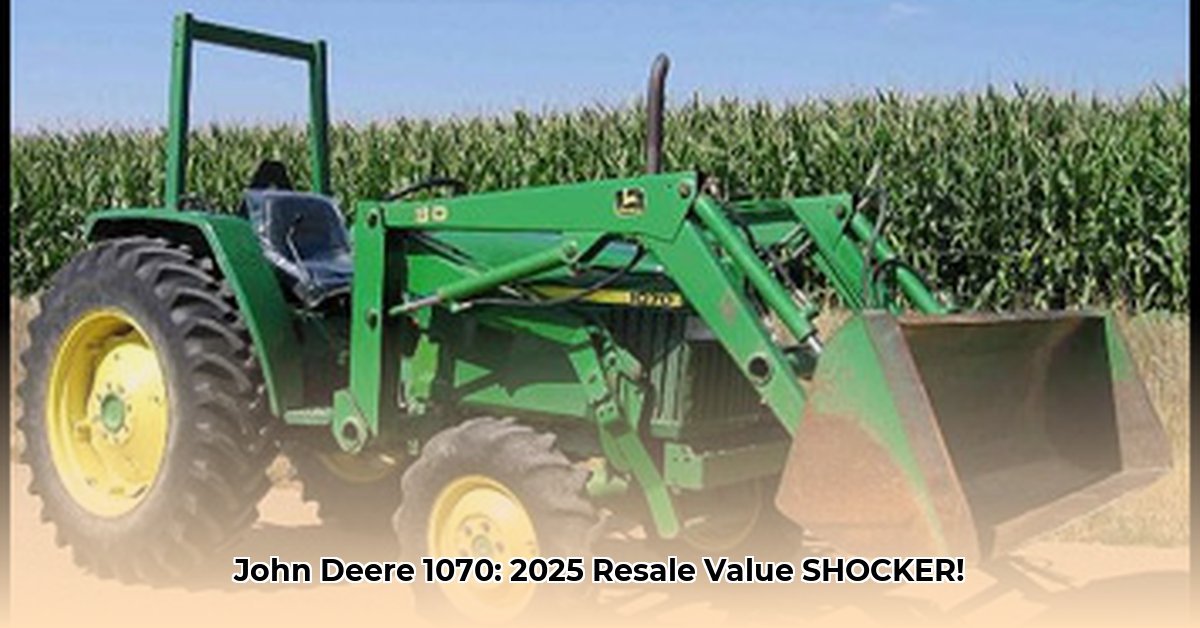
The John Deere 1070, a compact tractor produced between 1989 and 1998, maintains a surprisingly robust presence in the used agricultural equipment market in 2025. However, its resale value isn't a single figure; it's a range influenced by several key factors. Understanding these factors is crucial for both buyers and sellers navigating this niche market. For more detailed specifications, check out the owner's manuals. Resale prices currently span a wide range, from approximately $6,500 to nearly $20,000. Let's explore the variables driving this disparity.
Factors Influencing Resale Value of a Used John Deere 1070
Several interconnected factors determine the final price of a used John Deere 1070. Think of it like assessing a used car – age is only one piece of the puzzle. Condition, features, and market demand all play significant roles.
Operating Hours: Lower operating hours directly correlate with less wear and tear, resulting in higher resale value. High-hour tractors typically command lower prices due to increased potential for maintenance needs.
Condition and Maintenance: A meticulously maintained tractor with a comprehensive service history will fetch a premium price. Visible signs of wear, damage, or neglect will negatively impact its value.
Features and Attachments: The presence of desirable features, such as four-wheel drive (MFWD), significantly enhances a tractor's appeal and resale value. Additional attachments further increase market desirability.
Geographic Location: Regional variations in supply and demand influence resale prices. Areas with a higher concentration of potential buyers may see higher prices than those with lower demand.
Market Segmentation: Who Buys Used John Deere 1070s?
The John Deere 1070's compact size and robust capabilities cater to a specific market segment. This limits direct competition with larger tractors but also restricts the overall pool of potential buyers. Common buyers include:
- Smaller farms
- Hobby farmers
- Landscapers
- Homeowners with extensive land management needs
Stakeholder Perspectives on the 1070 Market
Different players in the used John Deere 1070 market have varying priorities and perspectives. Understanding these distinctions provides valuable insight into market dynamics.
| Stakeholder | Short-Term Focus | Long-Term Outlook |
|---|---|---|
| Private Sellers | Maximizing sale price while providing an accurate description of the tractor's condition. | Monitoring market trends to optimize pricing strategies and marketing efforts. |
| Used Equipment Dealers | Efficient inventory turnover through competitive pricing and thorough inspections. | Establishing a reputation for reliability and offering a diverse selection of tractors. |
| Parts Suppliers | Maintaining sufficient stock of common parts and providing excellent customer service. | Anticipating future demand to ensure parts availability and building strong relationships with repair shops. |
| Collectors/Hobbyists | Acquiring well-preserved tractors, ideally with original features and attachments. | Maintaining the tractor's historical value and sourcing rare parts. |
Isn't it fascinating how diverse these perspectives are? This market complexity highlights the need for informed decision-making.
Assessing Risk: Potential Issues with Used John Deere 1070s
Purchasing a used tractor always involves some level of risk. While the 1070 is known for its reliability, potential issues should be considered:
| Component | Potential Risk Level | Mitigation Strategies |
|---|---|---|
| Yanmar Engine (age) | Moderate to High | Regular maintenance; preemptive part replacements as needed. |
| Transmission (wear) | Moderate to High | Thorough pre-purchase inspection; consider transmission rebuild or replacement. |
| Hydraulic System | Low | Regular fluid level checks; prompt leak repairs. |
| Electrical System | Low | Thorough wiring inspection and replacement of faulty components. |
Determining Fair Market Value: A Multi-faceted Approach
Accurately determining a fair market value for a used John Deere 1070 requires a comprehensive approach. Simply relying on a single data point is insufficient. A robust valuation strategy considers multiple factors:
Depreciation: Tractors, like cars, depreciate over time. Understanding depreciation methods (straight-line, declining balance, etc.) helps refine valuation accuracy.
Condition Assessment: A thorough pre-purchase inspection is paramount. Document all aspects of the tractor’s condition, noting any necessary repairs.
Key Influencing Factors: Consider operating hours, technological features, maintenance records, market demand, and geographic location.
Comparative Market Analysis: Research recent sales of similar tractors on online marketplaces (e.g., Fastline) and at auctions. Seek professional appraisals for an unbiased assessment.
Negotiation: Armed with your research, you can confidently negotiate a price that reflects the tractor’s true value.
By incorporating these strategies, buyers and sellers can navigate the used John Deere 1070 market effectively. This meticulous approach minimizes risk and maximizes the chances of a mutually beneficial transaction.